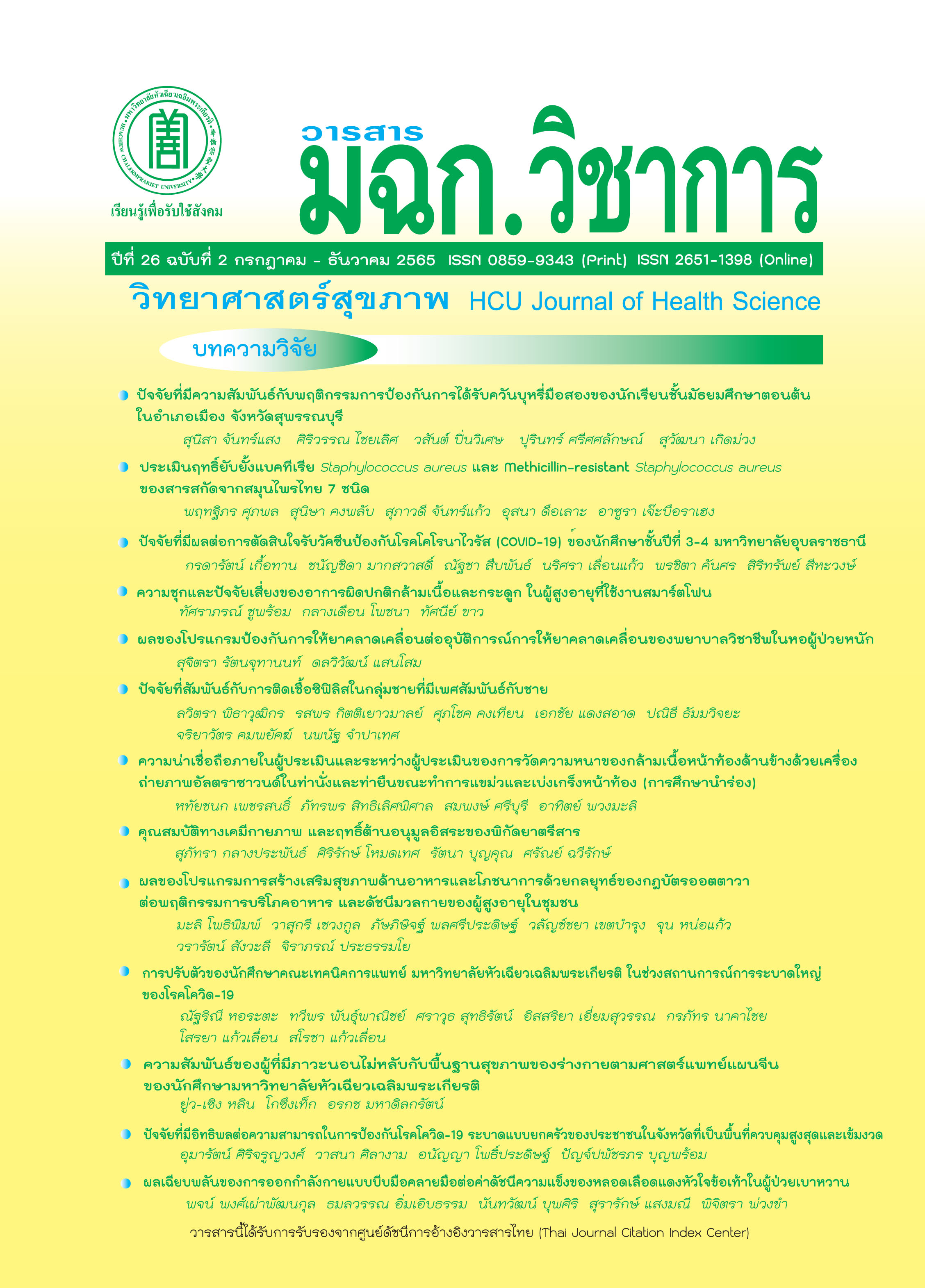Effects of Medication Error Prevention Program on the Incidence of Medication Administration Errors of Registered Nurses in an Intensive Care Unit
-
Keywords:
Program, Medication administration error prevention, Registered nurse, Intensive care unitAbstract
This research aims to study the effects of a medication administration error (MAE) prevention program on the incidence of medication administration errors among registered nurses in an intensive care unit (ICU). Samples were 2 groups of 18 registered nurses working in a surgical ICU of one tertiary care hospital during July and October 2021 who performed 4,640 medication administrations (MA). Research instruments included the MAE prevention program, nurse’s information sheet, and MA record form. Descriptive statistics and Mid-p-value were used for data analysis. Results indicated that the experimental group had an MAE incidence of 10.75 times/1,000-admission day while the comparison group developed MAE 22.90 times/1,000-admission day. The incidence rate difference between the groups was 12.15 times/1,000-admission day (IRD 12.15, 95% CI [-21.25, 45.55], p=0.566). The experimental group was 2.13 times less likely to develop MAE (Incidence risk ratio: IRR 2.13, 95% CI [0.17, 111.80], p=0.566). Results from this study reflect that the MAE prevention program may help reduce the incidence of medication error and has a positive potential to be used in actual clinical settings.
Downloads
References
Ameer A, Dhillon S, Peters M, Ghaleb M. Systematic literature review of hospital medication administration errors in children. Integr Pharm Res Pract 2015;4:153–65.
Agalu A, Ayele Y, Bedada W, Woldie M. Medication administration errors in an intensive care unit in Ethiopia. Int Arch Med 2012;5(1):1–6.
Irajpour A, Farzi S, Saghaei M, Ravaghi H. Causes of medication errors in intensive care units from the perspective of healthcare professionals. J of Research in Pharmacy Practice 2017;6(3):158–65.
Escrivá Gracia J, Brage Serrano R, Fernández Garrido J. Medication errors and drug knowledge gaps among critical-care nurses: a mixed multi-method study. BMC Health Serv Res 2019;19(1):1-9.
นงนุช หอมเนียม, สุชาดา รัชชุกูล. ผลของการพัฒนาการบริหารยาโดยใช้หลักฐานเชิงประจักษ์ต่ออุบัติการณ์ความคลาดเคลื่อนทางยาและความพึงพอใจในงานของพยาบาลวิชาชีพ หอผู้ป่วยวิฤต. วารสารพยาบาลศาสตร์ จุฬาลงกรณ์มหาวิทยาลัย 2559;28(1):139-50.
Alghamdi AA, Keers RN, Sutherland A, Ashcroft DM. Prevalence and nature of medication errors and preventable adverse drug events in pediatric and neonatal intensive care settings: A systematic review. Drug Saf 2019;42(12):1423–36.
Mohmmed RGA, El-sol AE-SH. Nursing innovations: Medication administration errors and safety. IOSR J Nurs Health Sci 2017;6(3):75–85.
สุนิษา เข็มทอง. ปัจจัยที่สัมพันธ์กับการบริหารความเสี่ยงด้านความคลาดเคลื่อนทางยาของพยาบาลวิชาชีพ ในโรงพยาบาลเอกชนแห่งหนึ่ง [วิทยานิพนธ์]. ชลบุรี: มหาวิทยาลัยบูรพา; 2559.
Zyoud A, Chew Abdullah NA. Human error in medication administration process. Mediterr J Soc Sci 2016;7(3):403–6.
Keers RN, Williams SD, Cooke J, Ashcroft DM. Causes of medication administration errors in hospitals: a systematic review of quantitative and qualitative evidence. Drug Saf 2013;36(11): 1045–67.
Shahrokhi A, Ebrahimpour F, Ghodousi A. Factors effective on medication errors: A nursing view. J Res Pharm Pract 2013;2(1):18–23.
Friedman, B. D., & Allen, K. N. Systems Theory [Internet]. 2014 (cited 2014 October 8). Available from: http://www.researchgate.net/publication/266615989
Craig JV, Smyth RL. The evidence based practice manual for nurses. London: Churchill Livingstone; 2002
Joanna Briggs Collaboration. The Joanna Briggs Institute [Internet]. 2014 [cited 2017 April 5]. Available from: joannabriggs.org/assets/docs/sumari/reviewersmanual
Zhou Q, Wang H-F, Jin J-F, Feng X-Q, Huang X, Zhao X-Y, et al. Quality improvements in decreasing medication administration errors made by nursing staff in an academic medical center hospital: a trend analysis during the journey to Joint Commission International accreditation and in the post-accreditation era. Ther Clin Risk Manag 2015;11:393–406.
Wondmieneh A, Alemu W, Tadele N, Demis A. Medication administration errors and contributing factors among nurses: a cross sectional study in tertiary hospitals, Addis Ababa, Ethiopia. BMC Nurs 2020;19(1):1–9.
Kane-Gill SL, O’Connor MF, Rothschild JM, Selby NM, McLean B, Bonafide CP, et al. Technologic distractions (part 1): Summary of approaches to manage alert quantity with intent to reduce alert fatigue and suggestions for alert fatigue metrics. Crit Care Med 2017;45(9):1481–8.
Simpao AF, Tan JM, Lingappan AM, Gálvez JA, Morgan SE, Krall MA. A systematic review of near real-time and point-of-care clinical decision support in anesthesia information management systems. J Clin Monit Comput 2017;31(5):885–94.
Smeulers M, Verweij L, Maaskant JM, de Boer M, Krediet CTP, Nieveen van Dijkum EJM, et al. Quality indicators for safe medication preparation and administration: A systematic review. PLoS One 2015;10(4):1–14.
Bifftu BB, Mekonnen BY. The magnitude of Medication Administration Errors among nurses in Ethiopia: A systematic review and meta-analysis. J Caring Sci 2020;9(1):1–8.
Feleke SA, Mulatu MA, Yesmaw YS. Medication administration error: magnitude and associated factors among nurses in Ethiopia. BMC Nurs 2015;14(1):1–8.
Plutínská Z, Plevová I. Measures to prevent medication errors in intensive care units. Cent Eur J Nurs Midwifery 2019;10(2):1059–67.
Vilela RPB, Jericó M de C. Implementing technologies to prevent medication errors at a high-complexity hospital: analysis of cost and results. Einstein (Sao Paulo) 2019;17(4):1–7.
Kim J, Bates DW. Medication administration errors by nurses: adherence to guidelines. J Clin Nurs 2013;22(3–4):590–8.
Downloads
Published
How to Cite
Issue
Section
License
Copyright (c) 2022 HCU Journal

This work is licensed under a Creative Commons Attribution-NonCommercial-NoDerivatives 4.0 International License.
บทความที่ได้รับการตีพิมพ์เป็นลิขสิทธิ์ของวารสารวิทยาศาสตร์สุขภาพและสุขภาวะ
ข้อความที่ปรากฏในบทความแต่ละเรื่องในวารสารวิชาการเล่มนี้เป็นความคิดเห็นส่วนตัวของผู้เขียนแต่ละท่านไม่เกี่ยวข้องกับมหาวิทยาลัยหัวเฉียวเฉลิมพระเกียรติ และคณาจารย์ท่านอื่นๆในมหาวิทยาลัยฯ แต่อย่างใด ความรับผิดชอบองค์ประกอบทั้งหมดของบทความแต่ละเรื่องเป็นของผู้เขียนแต่ละท่าน หากมีความผิดพลาดใดๆ ผู้เขียนแต่ละท่านจะรับผิดชอบบทความของตนเองแต่ผู้เดียว




